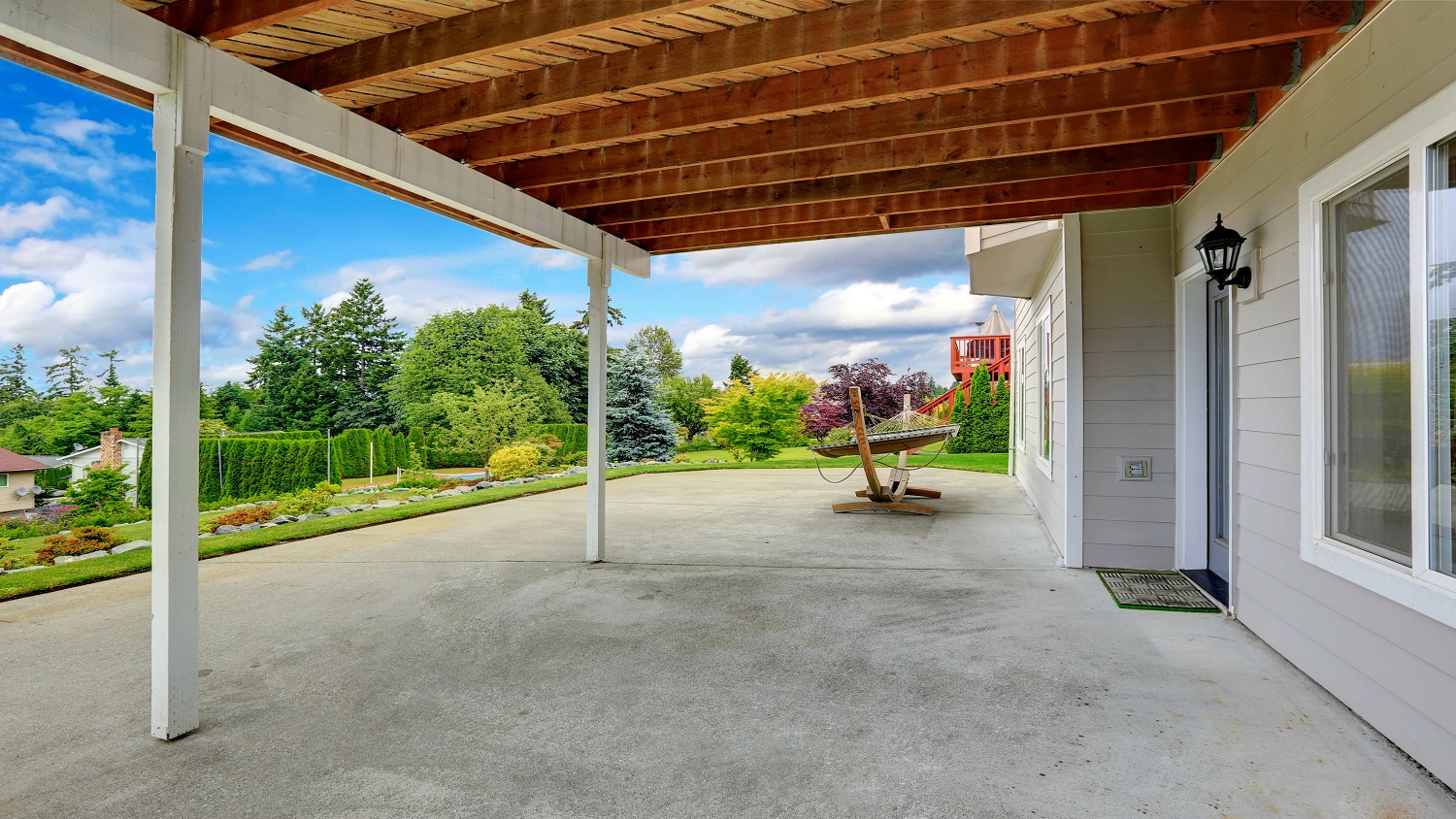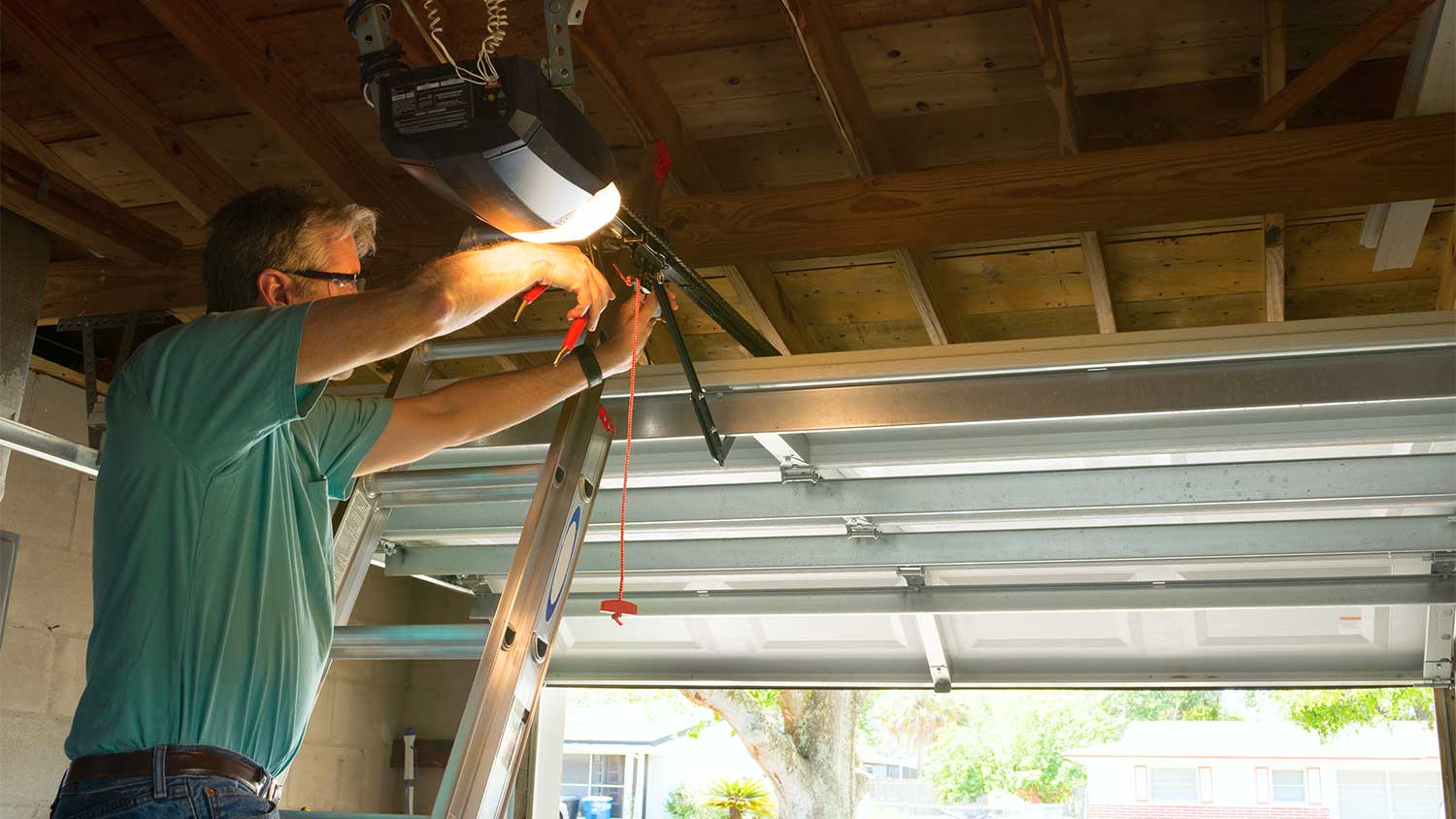
Use this guide to estimate the cost to build an RV garage based on its size, materials, and more.
Installing a garage door opener costs an average of $379


Most homeowners pay $379 for a professional garage door opener installation, with prices ranging between $218 and $540 on average.
Garage door installation costs are driven by labor rates, horsepower, and any extra features you choose.
Primary benefits include enhanced convenience, improved security, and potential energy savings.
Proper budgeting helps you avoid surprise expenses, and hiring a professional to install your garage door opener ensures a safe and secure result.
This article was updated using automation technology and thoroughly reviewed for accuracy by HomeAdvisor Editor Ryan Noonan.
Garage door opener installation costs most homeowners $379, or between $218 and $540, on average. Horsepower, local labor rates, and add-on features all impact the price. Beyond saving you the hassle of lifting a heavy door, an opener enhances security, making it an upgrade worth considering. Hiring a professional garage door opener installer ensures the job is done properly.
The opener style you pick is the single biggest driver of total installation cost. However, other factors—like whether it’s new or a replacement, local labor costs, horsepower requirements, and accessories—also affect the price.
Depending on your circumstances, the cost to replace a garage door opener can be lower than the cost to install one for the first time.
The cost to install a garage door opener is $379 on average, but it can cost between $218 and $540 or more if you splurge on extras. The opener itself can be anywhere from $100 to $900 or more, with extra parts and equipment sometimes adding to your cost. You might pay $50 to $75 more for additional parts, accessories, and equipment rentals.
If the existing rails or wiring are still in good shape, your garage door installation pro can reuse them, cutting down on labor hours and trimming the overall replacement cost. Budget for an extra half-hour of labor for removing the old opener.
Garage door openers range in power from 1/3 horsepower to two horsepower (hp). Lower-power units cost less. A 1/2 horsepower opener can cost as little as $100, while a much stronger two horsepower opener ranges from $300 to $400.
Openers rated at 1/3 hp can handle garage doors up to 150 pounds, while one- to two-hp motors can manage up to 400 pounds. Check the specifications for the motor to ensure it can handle the weight of your garage door, and consult with your garage door opener pro to determine the best fit for your needs.
Nearly every opener includes a built-in light. Look for one that clicks on as the door moves and stays lit for at least 30 seconds, giving you time to park and head inside safely. A model with an independent light switch allows you to switch the fixture on or off as needed for extra visibility.
Expect to pay $50 to $100 for a pair of safety sensors. Federal law has required them on all new garage doors since 1993, so every modern opener already includes sensors. If your system predates the rule, you’ll need to add them during installation.
Laser sensors scan for movement across the path of the garage door while it is operating. They immediately stop the door when motion is detected. Automatic reverse sensors go a step further. If motion is detected while the door is closing, these systems automatically reverse the door's direction and reopen it.
Local garage door opener installers charge between $60 and $80 per hour. An average installation takes two to six hours to complete, resulting in a total labor cost of $130 to $510 for this project.
If this is a new installation, you may need to find a local electrician to wire the garage door opener and add an outlet at the top of your garage.
Battery backups are available as an aftermarket accessory for $50 to $150. Chain drive openers often come without battery backups, but most other types of openers include them in the system.
Extension kits run $45 to $85, and you’ll need one if your garage door is taller than seven feet.
Annual garage door maintenance requires an hour of professional labor, equal to $60 to $80. Garage door openers can last 10 to 15 years if well-maintained. Maintenance items include checking the battery backup in the opener and the remotes, testing the sensors, inspecting the pulleys and cables for signs of wear and tear, and tightening the chains and belts as needed.
Garage door opener systems range in price from $200 to $900 or more, with commercial models reaching up to $1,500. The type of system you choose is one of the biggest factors in garage door opener installation cost.
| Opener Type | Average Cost Range |
|---|---|
| Chain drive | $150–$250 |
| Belt drive | $160–$350 |
| Screw drive | $150–$300 |
| Direct drive | $280–$500 |
Chain-driven garage door openers are the least expensive, running from $150 to $250. These garage door operators utilize a metal chain to move the garage door along the tracks, raising and lowering it.
Chain drive operators are the most basic in design and have been around the longest. They do not come with a battery backup. The biggest issue with chain drive garage door openers is the noise—they are much louder than other models as they work to move the door on demand.
Though chain drive operators are the most affordable and easy to install, they require more maintenance, including regular lubrication. They also do not last as long as other types of garage door opener systems.
Belt drive garage door openers cost between $160 and $350, depending on the model. They use a strong, steel-reinforced rubber belt and are significantly quieter than chain drive systems.
Unlike chain drive operators, belt drive garage door openers often include a battery backup. You can even find Bluetooth-enabled smart garage door openers that operate using a belt, though these cost more. Although they require less maintenance, belt drive openers can wear out more quickly than chains, and the belts are sensitive to extreme temperatures and excessive humidity.
Screw drive operators cost between $150 and $300. The operate with a metal rod that rotates like a screw. This motion opens and closes the garage door. This format is significantly quieter than a chain, and the systems have very few moving parts, resulting in lower maintenance costs. The system requires lubrication every few months.
However, screw drive garage door openers don’t do well with fluctuations in temperature and aren’t ideal for heavier garage doors. These issues, coupled with the advent of belt drive operators, have led many manufacturers to stop making screw drive openers.
Direct drive garage door openers range from $280 to $500. These models offer the simplest design. The motor itself raises and lowers the garage door without a need for a chain, belt, or screw. That means fewer moving parts and less maintenance.
Direct drive operators make very little noise, can lift heavier garage doors, and withstand more extreme temperatures. In addition to the federally mandated safety sensors, direct drive units come with automatic reverse safety systems.
All these benefits make direct drive operators more expensive. However, over time, they are often worth the investment in saved maintenance and garage door repair costs.
You might notice an issue with your garage door opener during everyday use. That does not mean it’s necessarily time for a full replacement. Garage door spring repair costs much less than replacing the opener altogether. Hire a garage door contractor to inspect the system and make repairs if possible, weighing the costs accordingly.
Installing a new garage door opener is not a dramatic value-add like a major renovation, but it can subtly contribute to your home’s overall appeal on the open market. Potential buyers may appreciate that the house is well-maintained and includes updated technologies, especially if you choose professionally installed garage door openers with smart features and safety sensors.
The cost to install a garage door opener may not directly increase your home’s assessed value. However, depending on local real estate market conditions, it can make your home more attractive to prospective buyers.
Understanding the key cost factors and budget strategies can help you make a better-informed decision about installing or replacing a garage door opener:
Request detailed quotes from at least three contractors to compare prices.
Examine the pros and cons of various garage door opener systems, as well as individual brands and models.
Choose garage door openers that best match your garage size and weight requirements.
Prioritize reliability and warranty over the lowest initial price to avoid costly repairs or replacements down the line.
Check for seasonal promotions or manufacturer rebates that can reduce your price.
Consider the costs of additional features like battery backup or smart home integration.
No place is more important than your home, which is why HomeAdvisor connects homeowners with local pros to transform their houses into homes they love. To help homeowners prepare for their next project, HomeAdvisor provides readers with accurate cost data and follows strict editorial guidelines. We surveyed over 10,000 real customers about their project costs to develop the pricing data you see, so you can make the best decisions for you and your home. We pair this data with research from reputable sources, including the U.S. Bureau of Labor Statistics, academic journals, market studies, and interviews with industry experts—all to ensure our prices reflect real-world projects.
From average costs to expert advice, get all the answers you need to get your job done.

Use this guide to estimate the cost to build an RV garage based on its size, materials, and more.

Need to replace your garage door? Here’s how much it costs, what factors affect cost, and what to expect.

How much does it cost to build a garage? Explore cost factors, budgeting tips, and how a garage adds to your home’s value with our detailed cost guide.

Wondering who seals concrete? Learn who to hire, when DIY makes sense, and how pros seal driveways and garage floors—start your search now

Wondering who to hire for garage door repair or installation? See when to call a garage door installer or technician and what to ask.

Discover who to hire to build a garage. Learn whether to hire a general contractor or garage builder, what to expect, and how much it costs.